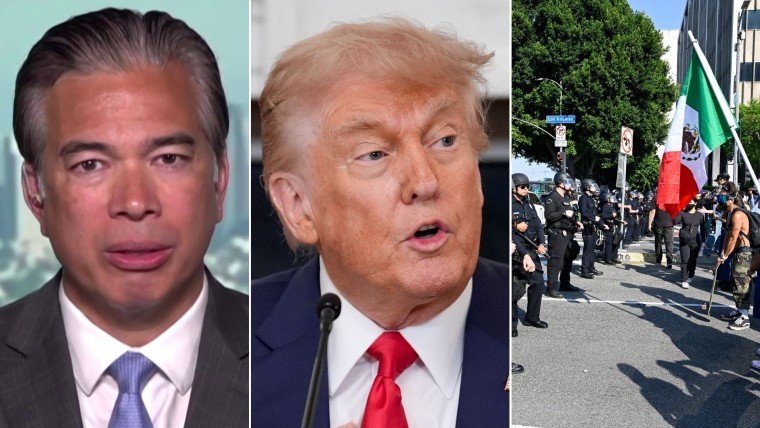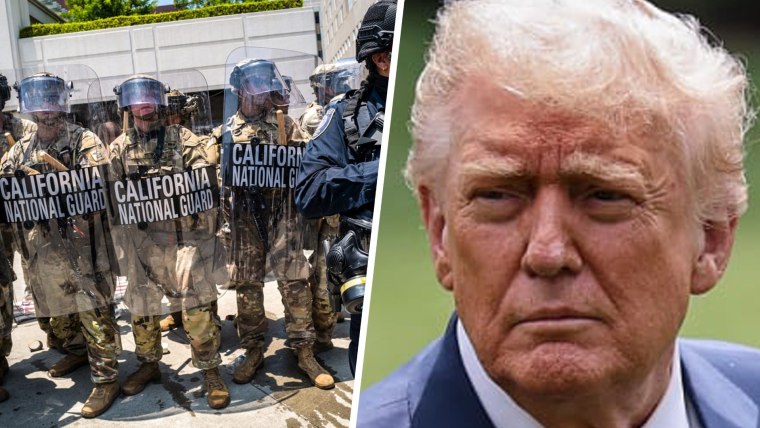UPDATE (June 10, 2:47 p.m. ET): On Tuesday afternoon, California Attorney General Rob Bonta filed an emergency motion, asking for a temporary restraining order “which will prevent the use of federalized National Guard and active duty Marines for law enforcement purposes on the streets of a civilian city. This motion does not seek to prevent any of those forces from protecting the safety of federal buildings or other real property owned or leased by the federal government, or federal personnel on such property.”
After President Donald Trump deployed the California National Guard into Los Angeles over the weekend against the wishes of California Gov. Gavin Newsom, the state is fighting back. Attorney General Rob Bonta announced California is suing the administration, arguing that Trump lacked the authority to federalize the National Guard in this case and was infringing on state sovereignty.
Trump’s decision to send in the National Guard may be morally (and politically) problematic. The difficulty facing California’s lawsuit is that federal law appears to give not just President Trump, but any president, broad authority to federalize the National Guard, whether or not a governor wants him to do so.
One problem for the state’s lawsuit is that there is of course no settled definition of what a rebellion is.
The primary legal question is whether the Trump administration had the power to federalize the National Guard against the wishes of the state’s governor. The presidential memorandum Trump issued Saturday deploying the National Guard invoked a little-used federal law, 10 U.S.C. § 12406. The power that Section 12406 confers on presidents is broad but not unlimited. It gives the president the power to federalize the National Guard when there is “a rebellion or danger of rebellion” against federal authority, or when the president cannot, using the usual mechanisms, execute federal laws.
Once the National Guard arrives, however, it can only support other law enforcement officers. They can help to protect federal law enforcement officers and federal property, but they cannot, for instance, perform searches and seizures. Why such limits? Because the Posse Comitatus Act prohibits the military from acting as a domestic law enforcement agency, except in extraordinary circumstances. And Section 12406 does not suspend the protections of the Posse Comitatus Act.
To invoke his authority under Section 12406, Trump concluded that, “[t]o the extent that protests or acts of violence directly inhibit the execution of the laws, they constitute a form of rebellion against the authority of the Government of the United States.”

California has argued that there is no such rebellion. One problem for the state’s lawsuit is that there is of course no settled definition of what a rebellion is. In addition, federal judges tend to defer to presidents when it comes to questions of national security. Federal judges, who are not chosen by voters, are generally wary of second-guessing the judgment of an elected president when it comes to questions of whether or not we are in danger of a rebellion.
California also argues that because Section 12406 requires that orders to federalize the National Guard be issued “through the governors,” that means that a president cannot take this action against the wishes of the state’s governor. However, the plain language of the statute does not include an explicit requirement of a governor’s consent. In addition, reading such a requirement into the statute would provide any state governor with veto power over a president’s decision under this federal law. That hardly seems consistent with congressional intent.
The legal landscape would change significantly if the president tries to invoke his power under the Insurrection Act.
Finally, California argues that Trump’s actions violate the 10th Amendment, which says that all powers not given to the federal government are reserved for the states and the people. But the plain terms of Section 12406 do appear to give the president the power to federalize the National Guard.
The legal landscape would change significantly if the president tries to invoke his power under the Insurrection Act. If he does, the protections in the Posse Comitatus Act are suspended, and the National Guard, and other branches of the military, can act to directly enforce domestic law. We are not there yet, but if Trump takes that step, it would be a dramatic escalation of an already historic standoff between the federal government and the state.

